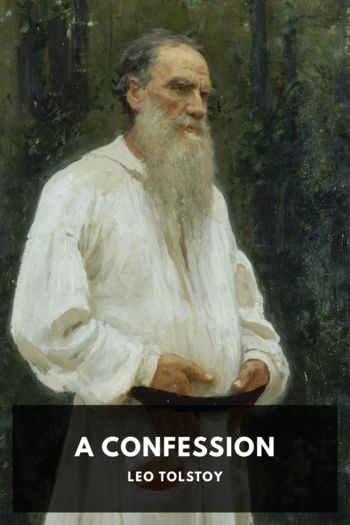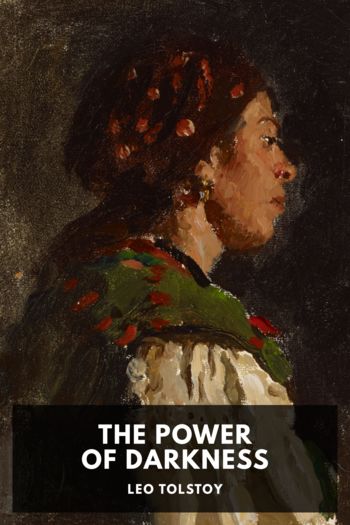Resurrection by Leo Tolstoy (best sci fi novels of all time TXT) 📕

- Author: Leo Tolstoy
Book online «Resurrection by Leo Tolstoy (best sci fi novels of all time TXT) 📕». Author Leo Tolstoy
Nathalie said nothing. Agraphéna Petróvna looked at her with a questioning look, and shook her head. At this moment the former procession issued from the ladies’ room. The same handsome footman (Philip) and the doorkeeper were carrying the Princess Korchágin. She stopped the men who were carrying her, and motioned to Nekhlúdoff to approach, and, with a pitiful, languishing air, she extended her white, ringed hand, expecting the firm pressure of his hand with a sense of horror.
“Épouvantable!” she said, meaning the heat. “I cannot stand it! Ce climat me tue!” And, after a short talk about the horrors of the Russian climate, she gave the men a sign to go on.
“Be sure and come,” she added, turning her long face towards Nekhlúdoff as she was borne away.
The procession with the Princess turned to the right towards the first-class carriages. Nekhlúdoff, with the porter who was carrying his things, and Tarás with his bag, turned to the left.
“This is my companion,” said Nekhlúdoff to his sister, pointing to Tarás, whose story he had told her before.
“Surely not third class?” said Nathalie, when Nekhlúdoff stopped in front of a third-class carriage, and Tarás and the porter with the things went in.
“Yes; it is more convenient for me to be with Tarás,” he said. “One thing more,” he added; “up to now I have not given the Kousmínski land to the peasants; so that, in case of my death, your children will inherit it.”
“Dmítri, don’t!” said Nathalie.
“If I do give it away, all I can say is that the rest will be theirs, as it is not likely I shall marry; and if I do marry I shall have no children, so that—”
“Dmítri, don’t talk like that!” said Nathalie. And yet Nekhlúdoff noticed that she was glad to hear him say it.
Higher up, by the side of a first-class carriage, there stood a group of people still looking at the carriage into which the Princess Korchágin had been carried. Most of the passengers were already seated. Some of the late comers hurriedly clattered along the boards of the platform, the guard was closing the doors and asking the passengers to get in and those who were seeing them off to come out.
Nekhlúdoff entered the hot, smelling carriage, but at once stepped out again on to the small platform at the back of the carriage. Nathalie stood opposite the carriage, with her fashionable bonnet and cape, by the side of Agraphéna Petróvna, and was evidently trying to find something to say.
She could not even say écrivez, because they had long ago laughed at this word, habitually spoken by those about to part. The short conversation about money matters had in a moment destroyed the tender brotherly and sisterly feelings that had taken hold of them. They felt estranged, so that Nathalie was glad when the train moved; and she could only say, nodding her head with a sad and tender look, “Goodbye, goodbye, Dmítri.” But as soon as the carriage had passed her she thought of how she should repeat her conversation with her brother to her husband, and her face became serious and troubled.
Nekhlúdoff, too, though he had nothing but the kindest feelings for his sister, and had hidden nothing from her, now felt depressed and uncomfortable with her, and was glad to part. He felt that the Nathalie who was once so near to him no longer existed, and in her place was only a slave of that hairy, unpleasant husband, who was so foreign to him. He saw it clearly when her face lit up with peculiar animation as he spoke of what would peculiarly interest her husband, i.e., the giving up of the land to the peasants and the inheritance.
And this made him sad.
XLThe heat in the large third-class carriage, which had been standing in the burning sun all day, was so great that Nekhlúdoff did not go in, but stopped on the little platform behind the carriage which formed a passage to the next one. But there was not a breath of fresh air here either, and Nekhlúdoff breathed freely only when the train had passed the buildings and the draught blew across the platform.
“Yes, killed,” he repeated to himself, the words he had used to his sister. And in his imagination in the midst of all other impressions there arose with wonderful clearness the beautiful face of the second dead convict, with the smile of the lips, the severe expression of the brows, and the small, firm ear below the shaved bluish skull.
And what seemed terrible was that he had been murdered, and no one knew who had murdered him. Yet he had been murdered. He was led out like all the rest of the prisoners by Máslennikoff’s orders. Máslennikoff had probably given the order in the usual manner, had signed with his stupid flourish the paper with the printed heading, and most certainly would not consider himself guilty. Still less would the careful doctor who examined the convicts consider himself guilty. He had performed his duty accurately, and had separated the weak. How could he have foreseen this terrible heat, or the fact that they would start so late in the day and in such crowds? The prison inspector? But the inspector had only carried into execution the order that on a given day a certain number of exiles and convicts—men and women—had to be sent off. The convoy officer could not be guilty either, for his business was to receive a certain





Comments (0)